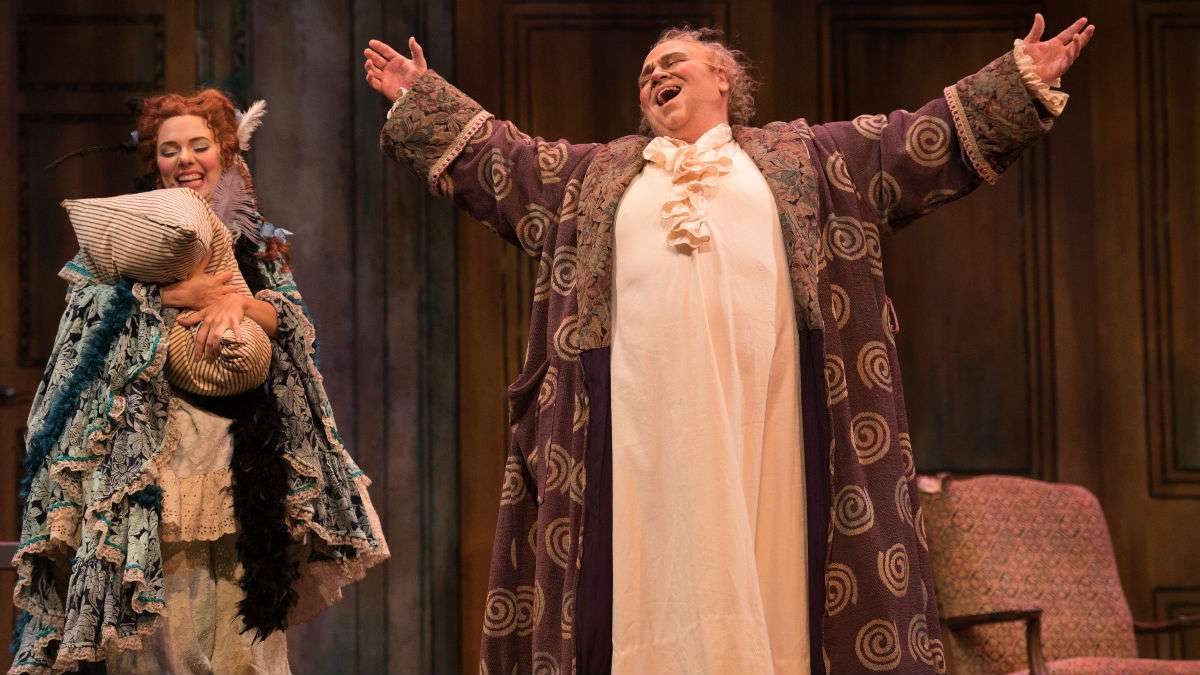OperaDelaware’s Spring Festival has become a valuable tradition
OperaDelaware’s Spring Festival has become a valuable tradition, a highly anticipated event that draws opera buffs from well beyond the borders of the First State.
Last year’s inaugural event paired the East Coast premiere of Franco Faccio’s long forgotten opera “Amleto” with a performance of Verdi’s “Falstaff.”
This year’s festival is dedicated to one composer only—Giaochino Rossini in celebration of the 225th anniversary of his birth. But this is no run-of-the-mill tribute as OperaDelaware has paired works that not only illustrate the serious and comic sides of this most influential composer but one—“Semiramide”—that rarely gets an outing.
The festival opened with a performance of “Semiramide” on Saturday night at the Grand Opera House in Wilmington. Rossini’s source for the opera, which debuted in 1823, is a play by Voltaire that infuses the legend of the title character, the promiscuous queen of Babylon, with elements of the Oedipus myth as well as overtones from Macbeth.
Long before the curtain rises, Semiramide conspired with her lover Assur to poison her husband, King Nino, and seize his throne. Now wracked by guilt and stalked by Nino’s Banquo-like ghost, she finds herself attracted to the young army officer Arsace ignorant not only of the fact that he is her long-lost son but also that he is under divine orders to avenge his father’s death.
“Semiramide” is a psychological drama that takes the protagonists’ voices to their technical and expressive limits to explore the emotions that ensue from this heinous act.
Soprano Lindsay Ohse was a consummate Semiramide who brought a stunning technique to the role, impressing not only with her command of coloratura but with her range and the strength of her middle and lower registers. She also managed to infuse this unlikable character with a touch of humanity as evidenced in her delight in her new found love of Arsace.
Aleksandra Romano’s rich mezzo-soprano made for a convincing—and at times conflicted—Arsace, blending beautifully in the pair of duets she shared with Ohse. The two had obviously forged a strong working relationship.
Daniel Mobbs was perfect as Semiramide’s paramour and co-conspirator Assur. His powerful and nimble bass-baritone met the technical demands with ease and consistency. He really came into his own in Assur’s final scene in which the character’s nightmarish visions approach a mad scene that points the way to future developments in Italian opera.
Tenor Timothy Augustin provided a graceful rendering of Idreno’s aria. Bass Harold Wilson was stentorian in the important role of the all-knowing high priest Oroe. Young-Bok Kim was equally trenchant in the role of the Ghost of King Nino.
Maestro Anthony Barrese kept a firm grip on the long passages allowing excitement to build but never letting the music race out of control.
Peter Tupitza’s minimalist set was effective while allowing room for Howard Tsvi Kaplan’s costumes to glitter without undue competition.
“Semiramide” is not your everyday opera but one that deserves to shine in the footlights a bit more often.
Sunday afternoon’s performance of “Cinderella” (“La Cenerentola”) was pure magic.
The opera which debuted in 1817 changes the familiar fairy tale in several ways. The wicked stepmother is replaced by a buffoonish stepfather and the glass slipper is traded for a bracelet. But the most important change involves the Fairy Godmother. Her character gets replaced by a philosopher, Alidoro, who sees the goodness in the downtrodden Angelina (Cinderella) and sets in motion a series of events that allow her to become the prince’s bride.
Mezzo-soprano Megan Marino is the main attraction as Angelina and she does not disappoint. Her facility with the coloratura lines was effortless, her acting totally natural and her enthusiasm and energy unflagging.
Jack Swanson applied his ringing, powerful tenor to the demanding role of Prince Ramiro, consistently note-perfect in the score’s difficult runs with their enormous range and rapid articulation.
Baritone Steven Condy nearly stole the show as the boorish Don Magnifico. He virtually blended into the role with his hardy voice and outstanding acting.
The remaining cast members were nothing short of excellent. Soprano Jennifer Cherest and mezzo-soprano Alexandra Rodrick played the stepsisters Clorinda and Tisbe respectively with clown-like wit and agility. Baritone Sean Anderson delivered a witty Dandini engaging in a sly homoerotic exchange with Magnifico and tossing out an off-the-cuff reference to another Rossini opera. Young-Bok Kim ran the show from the sidelines with his rich bass and dramatic deadpan.
Conductor Michael Borowitz employed the capable orchestra to great effect in building and sustaining momentum.
—
The festival continues this weekend with performances of “Cinderella” (“La Cenerentola”) and “Semiramide” on Saturday May 6 and Sunday May 7 respectively. There will also be a performance of Rossini’s Petite messe solennelle on Friday, May 5. For more information on performance times and to purchase tickets, visit www.operade.org.
WHYY is your source for fact-based, in-depth journalism and information. As a nonprofit organization, we rely on financial support from readers like you. Please give today.
















